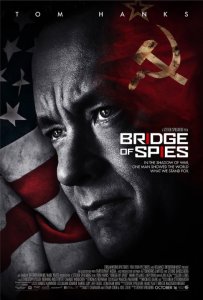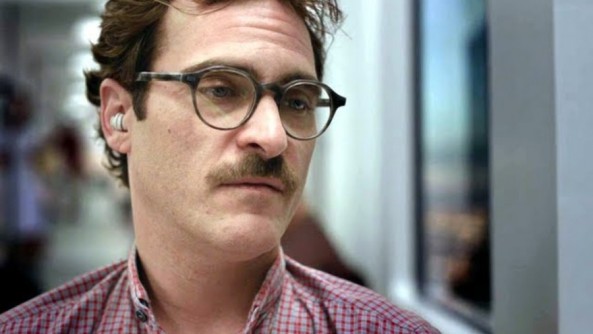“Cloud Atlas” opens with an old man muttering under his breath, talking about the juju o’ the bayou, or at least that’s what it sounds like. It’s a super close-up after looking down from the stars, so it feels a little profound, a little silly, a little captivating. Then you realize it’s Tom Hanks with really good makeup, and you realize very quickly this movie is bananas.
“Cloud Atlas” is a wild mess of a movie. It tells six stories over countless centuries, sharing actors and thematic structure, but only just barely narrative. So at times the whole thing is pegged to be philosophical and thought provoking, and then Jim Broadbent learns to drive an SUV and runs over Hugo Weaving wearing drag as they escape from a nursing home.
Whether or not it’s actually about anything is beside the point. It has the same transcendent, sci-fi possibilities and mumbo-jumbo that “The Matrix” did, which was also directed by Andy and Lana Wachowski (the siblings have paired up with “Run Lola Run” director Tom Tykwer), but at the end of the day it’s a fun journey through time with just as much visual imagination.
Describing how the plot functions is an effort in futility, but the movie itself actually does it best. “Each thing is understood moment to moment, but at any moment it could be headed in a different direction.” This may just be the movie accounting for its own jumbled narrative, but that is how “Cloud Atlas” feels. It flits in time, but none of it is particularly dreamlike or even surreal. Each of the six stories, if you broke them apart as they are, are presented linearly.
The only confusing part is the excessive crosscutting that the Wachowskis and Tykwer employ. They may jump from a barbarian attack scene in the dystopian future to the performance of a sonata in 1932 to a sex scene in the 22nd Century to a sight gag or punch line in modern day London. The brilliant thing is that they’re often edited as though they are one scene, completely different in terms of even the mood we’re supposed to feel, but fluid in their pacing and action. At one point when Halle Berry crashes her car off a bridge and plummets into the water, the movie leaves her hanging for nearly 20 minutes before we see her making her escape. To have it happen when it does, a theme of rescue seems to permeate throughout all the other story threads.
“Cloud Atlas” is all about its themes rather than concrete ideas. We start with each character sharing in an unlikely encounter. We see them experience feelings of escape, rescue and discovery, and before long they’ve all suffered loss and hardship, if not action. Voice over narrations, the image of a comet shaped birthmark and miniature Easter eggs connecting the stories suggest that our lives are not our own, that our spirits carry through generations, but because the stories never truly intersect, do they mean anything beyond wispy ideas?
I don’t think it matters much, because the movie’s lushness sweeps us up in its visuals and ideas. We see futuristic cityscapes, treacherous mountain ranges, majestic long shots on the high sea and colorful rooms that materialize with possibilities right before our eyes.
On a technical level alone, “Cloud Atlas” is a remarkable achievement. The running time is nearly three hours, but because the stories are so out of sequence we’re not checking our watch awaiting the next one to start. We’re mystified by the makeup that makes Tom Hanks, Hugo Weaving and Hugh Grant at times unrecognizable. We’re moved by the complex and exuberant performances of Jim Broadbent and Doona Bae, a South Korean actress who fully owns a rare lead part for Asians in a big budget movie.
Something that was more art house would also be more metaphorical in its ideas and imagery. The Wachowskis and Tykwer however put all their brainstorming right into the mouths of their characters. So moment to moment we get a line that resonates on an intellectual level, another that comes from a crazed Mad Hatter and seems laughable and another that is intentionally laughable. These ideas would be a slog if it jammed them down our throats, but perhaps like the way the filmmakers think the world operates, these possibilities are released like spirits floating in the movie’s universe.
I imagine I’ll see “Cloud Atlas” again very shortly, not because it’s a dense movie that needs to be unraveled, but because it’s a magical movie that makes it fun to be insightful.
3 ½ stars
 As Emma Watson drives up to the campus of The Circle, the fictional, Google-like, Silicon Valley tech giant in James Ponsoldt’s film of the same name, the exterior is a massive, circular stone wall stretching to infinity on an island unto itself. It looks like a fascist fortress straight out of “The Hunger Games.” Even though the interior is a sort of millennial utopia, it’s not a stretch to ask, “I wonder if these guys turn out to be evil?”
As Emma Watson drives up to the campus of The Circle, the fictional, Google-like, Silicon Valley tech giant in James Ponsoldt’s film of the same name, the exterior is a massive, circular stone wall stretching to infinity on an island unto itself. It looks like a fascist fortress straight out of “The Hunger Games.” Even though the interior is a sort of millennial utopia, it’s not a stretch to ask, “I wonder if these guys turn out to be evil?”

 It’s fitting that “Sully,” the latest film by Clint Eastwood about the “Miracle on the Hudson” pilot Chesley “Sully” Sullenberger, has been released on the weekend of 9/11’s 15th Anniversary. The worst happened that day, and we’re lucky to have first responders to celebrate this weekend. But what Sully experiences in Eastwood’s film casts doubt over whether he’s a hero at all, or whether he or all the other “heroes” could’ve done more to save others.
It’s fitting that “Sully,” the latest film by Clint Eastwood about the “Miracle on the Hudson” pilot Chesley “Sully” Sullenberger, has been released on the weekend of 9/11’s 15th Anniversary. The worst happened that day, and we’re lucky to have first responders to celebrate this weekend. But what Sully experiences in Eastwood’s film casts doubt over whether he’s a hero at all, or whether he or all the other “heroes” could’ve done more to save others.

